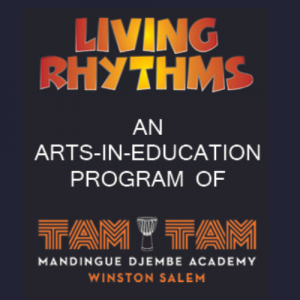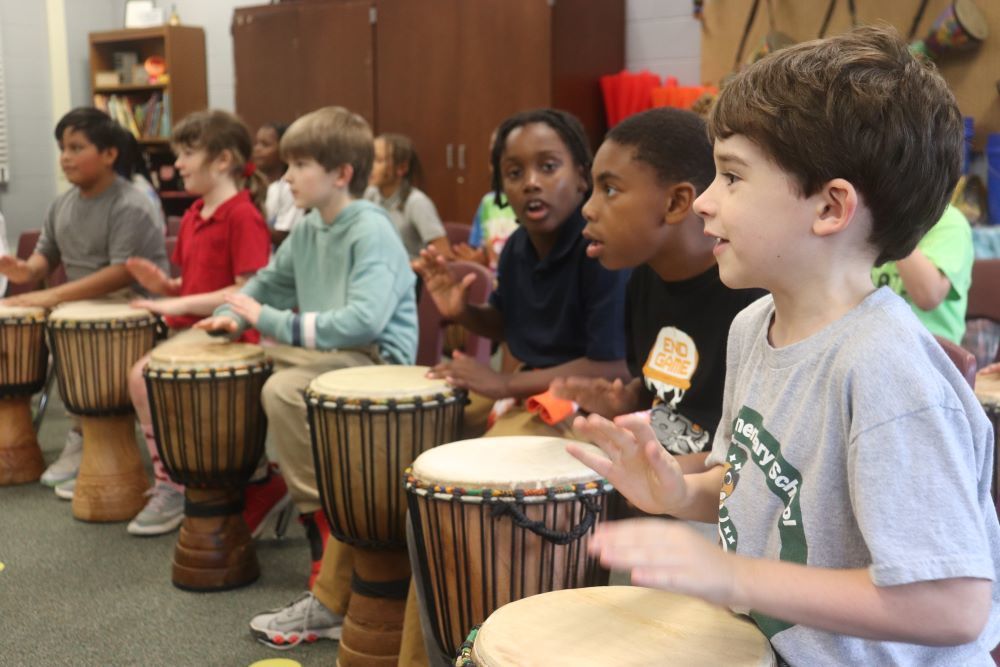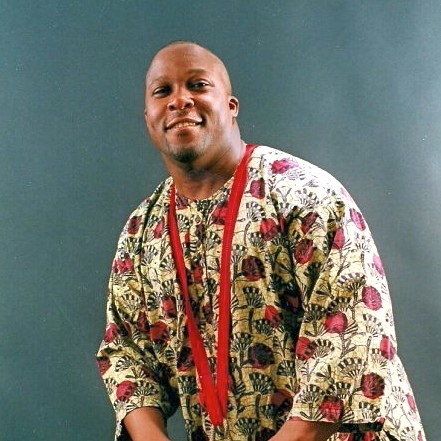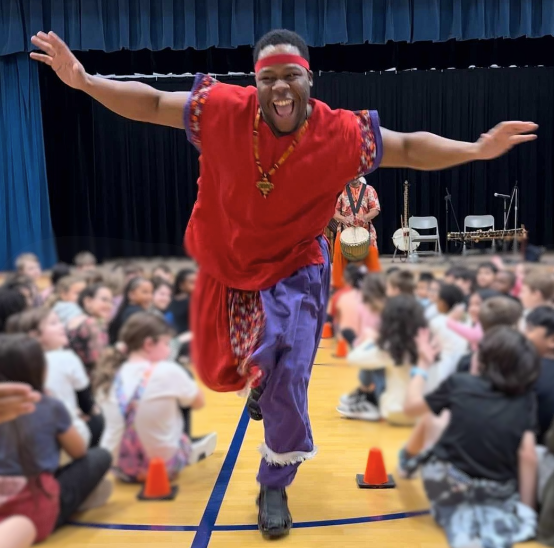

Our arts in education program, Living Rhythms makes the news!
Tam Tam Mandingue Brings Living Rhythms to Moore
Tam Tam Mandingue Djembe Academy gave students at Moore Magnet Elementary School…
Read the article HERE.
With an authentic imported drum for every student, these powerful educational programs immerse students in both the music and dance of West Africa.
Specifically designed around the Common Core, participants learn rhythms and songs that represent the traditions of several African ethnic groups, then learn dances that historically accompany the musical selections. Strong emphasis is placed on the traditional West African values of respect, community and teamwork. Living Rhythms workshops broaden students’ understanding of our increasingly interdependent world, and encourage them to embrace a life of critical thinking.
Mission
It is our mission to enrich the communities we serve by creating flourishing arts programs that positively impact the lives of young people. By exposing students to the music and dance of West Africa, we aim to broaden students’ understanding of our increasingly interdependent world, and encourage them to embrace a life of empowerment and critical thinking. The joy and community spirit inherent in drumming and dancing gives students direct access to the concepts of respect, harmony, and responsible world citizenship.
Educational Impact
Common Core Connections
Our programs are specifically designed around the Common Core State Standards. Our programs connect to multiple Anchor Standards for Reading, Speaking and Listening, and Language for K-8 as well as multiple Social Studies and Arts Education Standards for K-8. For the purposes of brevity, we have described here our program’s top connections to each set of standards.
Connections to the Common Core State Standards Reading, R4
Interpret words and phrases as they are used in a text, including determining technical, connotative, and figurative meanings, and analyze how specific word choices shape meaning or tone. In our case, scholars identify and respond to key rhythmic phrases that occur in the genre of West African drumming which convey instructions to the musicians to start, stop or change the music.
Connections to the Common Core State Standards Reading, R7
Integrate and evaluate content presented in diverse media and formats, including visually and quantitatively, as well as in words. In our case, evaluate the number and pitch of notes in a rhythmic pattern played on a drum, and demonstrate the ability to integrate the pattern to the degree that the pattern can be reinterpreted and repeated back.
Connections to the Common Core State Standards Reading Foundations, RF4
The comparison between syllabication and rhythm is used as an illustrative tool to help students hear what certain fractions sound like and to expedite a student’s ability to learn and perform the music in a short period of time.
Connections to the Common Core State Standards Speaking and Listening, L1
Prepare for and participate effectively in a range of conversations and collaborations with diverse partners, building on others’ ideas and expressing their own clearly and persuasively. In our case, responding to a rhythmic idea by creating a complementary pattern, thereby collaborating with fellow participants to create a musical conversation.
Connections to the Common Core State Standards Mathematical Content, Standard 7
Look for and make use of structure – where proficient students look closely to discern a pattern of structure. In our case, students model and apply pattern discernment through the practice of learning rhythmic patterns, and by extending this understanding to build complex musical arrangements.
Connections to the Common Core State Standards International Studies
Students explore the physical and social environments of other cultures while learning to understand and respect cultural pluralism. Students become more aware of the concepts interdependence, and responsible world citizenship through the study of other cultures.
Connections to the Common Core State Standards Music
Students explore a variety of musical concepts such as polyrhythm, meter, tempo and dynamics.
Supporting Research
Neurological Data on Music and Brain Development
There is a rapidly growing body of neurological research directly supporting the impact of music on brain development. These findings show that exposing children to music has educational impacts in the areas of reading, writing, language arts, and mathematics.
Music and Brain Size Development
Musicians have an increased size and function of the corpus callosum area of the brain. The corpus callosum is involved with communication and inter-hemispheric integration of the brain. There is a significant increase in musicians who began studying music as children. (Schlaug G, Janke L, Huan Y, Staiger JF, Stenmeitz H. “Increased Corpus Callosum Size in Musicians.” Neuropsychologia 1995; 33:1047-1055)
Reading and Writing
There is an increased volume of the cerebellum in musicians vs. non-musicians. The cerebellum is linked with the ability to interpret written letters and words. (Huchinson S, Lee LHL, Baab N, Schlaug G. “Cerebellar Volume: Gender and Musicianship Effects.” Cerebral Cortex 2003, in press.)
Language Arts
CAT scans reveal that listening to music affects both right and left frontal lobes of the brain, which are involved in language production. The ability to keep a steady beat is linked to linguistic development. “Weikert, Phyllis. Movement in Steady Beat. High Scope Educational Research Foundation.
Mathematics
Memorization of intricate patterns increases brain function and memory capacity for math and science. “How to Improve Brain Function” Improve Brain Function, 2010. Web, Oct 18,2011.
Life Skills and Academic Achievement
During our programs students are engaged in an exploration of the cultural, historical and geographical context of the arts they are studying. Connections are drawn between the way traditional West African cultures value empowerment, respect, community, and teamwork and how these values contribute to our success in modern life. The programs incorporate strong elements of creative self-expression and critical thinking, while emphasizing cultural diversity and responsible world citizenship. Our artist educators use the Positive Discipline Parenting and Classroom Management Model based on the work of Dr. Alfred Adler and Dr. Rudolf Dreikurs. At all times scholars are treated with love, respect and dignity – and are encouraged to treat each other in the same manner.
As a culturally diverse arts-based residency, our program encourages the type of transformational creative thinking that enables scholars to solve problems throughout the course of their lives. Our programs help create the type of engagement and empowerment that can propel a scholar to promotion at all grade levels, and ultimately graduate as a successful and productive member of society. Designed to promote literacy learning through the arts, and aligned with the Common Core Standards, our programs give scholars a vehicle to close the achievement gap by applying learning from in-school experiences in a unique and creative way.
Living Rhythms Expertise and Experience
Living Rhythms has provided hands-on residencies, workshops and performances in West African drumming and dancing to over 275,000 students at schools throughout the US for the last 18 years. With differentiated instruction for grades preK-12, our team of artist-educators has a strong history of demonstrated ability to successfully communicate in a school environment with children. The artist-educators on our diverse team have extensive experience and training as educators, and some were teachers in public schools before joining our company. Additionally, each has an impressive personal history of strong artistic accomplishments, studying and performing across Africa, the US and beyond.
For a complete list of schools served, click here!
Artists Who Work With Us

Greg Ince – Contracted Artist
Before working with Living Rhythms, Greg Ince was an NYPD School Safety Officer and a teacher in the Kansas City school system. Greg has more than three decades of experience teaching African drumming and dancing in schools across the US. He is a drummer and educator who is passionate about sharing African culture with others.
Raised in Brooklyn, New York, by his Cuban father and Panamanian mother, Greg comes from a family of talented percussionists. His thirst for music led him to study with teachers such as Papa Ladji Camara, Mamady Keita, Abdou Kounta, Abdoul Doumbia, and Fadouba Oulare.
Greg has performed both at home and abroad with great artists and ensembles such as Alvin Ailey, Arthur Mitchell and the Dance Theatre of Harlem, Marie Brooks’ Caribbean Dance Theatre, and the Chuck Davis African American Dance Ensemble.

Dakarai Ince- Contracted Artist
Dakarai Ince, immersed in West African drumming and dance from the age of three, developed a deep passion for both art forms through early performances with his parents. Over the years, he has traveled across the U.S., participating in performances, lectures, and workshops while teaching drumming and dance to students from elementary to college levels. His extensive experience working in schools includes leading interactive workshops and residencies for children, where he uses music and movement to foster cultural awareness, teamwork, and self-expression. Dakarai’s engaging approach has inspired countless young students, making African drumming and dance accessible and exciting for children of all ages.
Read more
What Teachers and Students are Saying
Yesterday was AWESOME! The kids LOVED it!! Everyone was engaged and enjoyed it! A lot of the teachers said this was the best assembly we’ve ever had!
Bravo, and we look forward to doing more work with you! – CREC Academy of Aerospace and Engineering Elementary
I’ve learned so much just listening. Like listening to Diali and to Will and your teaching. I loved the lesson of respect. And I loved how everything that we’ve learned through your presence here supports all of the character strengths that we learn about here at Jeffreys Grove, how everything just intertwines beautifully. It’s an amazing, amazing experience that I’ve very grateful for. – Ms. Chapman, teacher
I’m gonna take home the respect that you guys taught us and how you guys taught us to play these drums because we never played these drums before. Some of us never played these drums before so we’re thankful that you guys brought the drums here. – Student
I think it’s a very humbling experience because I’m very vulnerable here. I’m glad I had the opportunity to struggle with my boys and then having everybody see how I persevered. And I tried and I talked about what I was feeling and what my problems were and we were able to find a solution, and then they see that now I can do it and I think that’s very humbling and I think something very nice for me as a teacher to show them that I don’t know everything but that I persevered and that when you persevere you can do things. – Mr. Osorno, teacher
It makes me really happy because I always wanted to play a type of drum and this makes me really happy and I’ve been practicing a lot right before I go to bed and I’m just really glad I get to do this experience. – Student
The rhythms of the music… like I had no clue that we were actually gonna learn these cool rhythms and I would really just travel all the way to Africa just to get one of these drums and practice forever. And you all just feel like family. – Student
I’m going to miss it when you guys leave because you guys are funny, kind, and you are always helping us if we get something wrong you always try to help us and try to make us get it right and if we get it wrong it’s not like wrong, we can still fix it. – Student
CONTACT US FOR A FREE QUOTE!
Tel/Fax: 336-774-3898
info@ttmws.com (Preferred)
Office Hours: M-F 9:00 am to 5:00 pm
Closed Weekends and Holidays
